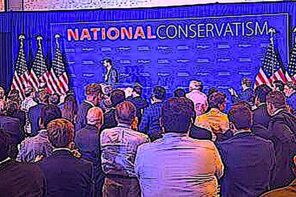This past weekend at AT&T Stadium in Arlington, Texas, marked the official public return of the Promise Keepers, their first in-person gathering since the 1990s. Founded by former University of Colorado football coach Bill McCartney in 1990, Promise Keepers was intended “to bring about revival through a global movement that calls men back to courageous, bold, leadership. We will be the spark that calls men back to God’s Word, sharing their faith and caring for the poor and oppressed throughout the world.” This mission was most notably accomplished through large revival-style events at sports stadiums throughout the 1990s. While they continued to build an international footprint, Promise Keepers’ influence waned domestically in the initial decades of the 21st century.
As evangelical Christianity is embroiled in an internal divide over the proper direction and approach to racial reconciliation amid the Black Lives Matter era and in the aftermath of the failed political prophecies of Trumpism, Promise Keepers clearly sees this as a prime moment to reboot itself.
The Promise Keepers organization is based on Seven Promises:
Promise #1 Honor: A Promise Keeper is committed to honoring Jesus Christ through worship, prayer and obedience to God’s Word in the power of the Holy Spirit.
Promise #2 Brotherhood: A Promise Keeper is committed to pursuing vital relationships with a few other men, understanding that he needs brothers to help him keep his promises.
Promise #3 Integrity: A Promise Keeper is committed to practicing spiritual, moral, ethical, and sexual purity.
Promise #4 Family: A Promise Keeper is committed to building strong marriages and families through love, protection and biblical values.
Promise #5 Serving: A Promise Keeper understands that Jesus calls him to be His hands and feet, serving others with integrity. He purposely lifts up the leadership of the church and his nation in prayer.
Promise #6 Unity: A Promise Keeper is committed to reaching beyond any racial and denominational barriers to demonstrate the power of biblical unity.
Promise #7 Obedience: A Promise Keeper is committed to influencing his world, being obedient to the Great Commandment and the Great Commission.
These Seven Promises are rooted in the evangelical perspective that man is the head of the prototypical household in which women and children follow his lead as spiritual authority. The problems inherent in this approach to manhood and masculinity have been well-discussed on RD, but it’s Promise #6, on Unity, that piques my interest here. A recent Christianity Today piece, “Promise Keepers Tried to End Racism 25 Years Ago. It Almost Worked” argues that, a few minor stumbles aside, the group was nearly successful in conquering racism in America. But this sympathetic account of Promise Keeper efforts at racial reconciliation highlights a glaring problem that can only be seen as a weakness of evangelical approaches to racial strife.
While it does appear as though Promise Keepers’ desire for racial reconciliation was earnest and sincere, as former members admit, it lacked an organized plan for racial reconciliation. It placed far too much focus on personal experience and accountability which left racial reconciliation an unfulfilled goal—a broken promise, you might say. Participants at a Promise Keeper gathering may have experienced genuine moments of interracial harmony and be left with the impression that they had achieved personal racial reconciliation with their brothers of color, but those good feelings did little to right the systemic wrongs in American culture that remain relatively unchanged since the height of Promise Keeper popularity.
Fast forward to today and Promise Keepers are inhabiting a new landscape dominated by social media, hyper-partisanship, and balkanized media outlets that keep Americans of every background in cocoons of confirmation bias. Whereas in the ‘90s Promise Keepers were at the forefront of articulating what would become a 21st century American Christian masculinity, they’re now just one of many as muscular Christianity abounds in evangelical circles. Nevertheless, in the midst of the social unrest of 2020 Ken Harrison relaunched Promise Keepers with a focus on a more localized approach and the stated goal of “worship that strengthens the soul, brotherhood that lasts a lifetime, and tools that empower you to be the man Christ intended you to be.”
Harrison also reiterates the Promise Keeper commitment to racial reconciliation:
“Promise #6 [Unity] of a Promise Keeper is a solemn commitment to reach beyond any racial and denominational barriers to demonstrate the power of biblical unity. We need to demonstrate that power more than ever. Racism is a festering wound that has scarred the otherwise proud history of America. Christians must continue to lead the way in racial reconciliation and healing as we live out God’s call to treat all people as more important than ourselves (Phil 2:3). I call on Promise Keepers everywhere to demand respect, justice, equal protection and equal opportunity under the law for everyone—and that includes police officers as well.”
But, as we can see, Harrison’s Promise Keepers still have the same achilles heel: namely, a complete lack of understanding of or appreciation for systemic racism and the complicity of American Christianity in the enduring nature of racism. To Promise Keepers, racism is merely a “festering wound,” not a fundamental part of the DNA (much less an “original sin”) of America. Adding to the problematic nature of this approach, Harrison gives a nod to “all lives matter” logic with his salient inclusion of police officers and no mention of the Black and brown communities against whom police violence is so often directed.
Promise Keepers, like other evangelical attempts at tackling America’s racial problems, have settled on a self-serving notion of racism as “sin” and ultimately the work of Satan. As such, changing the hearts and minds of individuals becomes the focus while leaving the structure of white supremacy firmly in place. Harrison’s equivocation on critical race theory further illustrates this point:
“There may be Christians who are saying, It’s critical race theory so I’m not going to get involved, but just because the world has a certain way of seeing things, it doesn’t mean it’s wrong. It may be the right issue, but the solution is wrong, because the solution is always Christ…I think if we try to solve this problem the world’s way and try to make this problem go away in some other way than changing the hearts of people, then it will never last.”
Harrison admits that racism does exist, in other words, but he believes that only Christ, not CRT, can fix it. Harrison’s response to systemic racism typifies that of evangelical Christians who want to claim a spirit of seriousness while evading the responsibility of taking meaningful steps to dismantle the system in place. Note that Promise Keepers only want to “reach beyond” racial barriers, not dismantle those that have been erected and scripturally justified by generations of their white Christian forebears.
Note, too, that while evangelicals like Promise Keepers seek to change hearts and minds with regard to racism, they have no qualms about calling on the power of the state when it comes to abortion, LGBTQ rights, and other areas of concern. Harrison isn’t alone in this approach to racial reconciliation. Since its inception Promise Keepers have included African-American clergy and lay leaders who’ve had varying degrees of influence on the organization. In the rebooted Promise Keepers, notable pastors such as board member Donald Burgs, Jr. president of African American Fellowship of Southern Baptist Convention of Texas, and megachurch pastor Tony Evans, help steer the direction of the organization. Promise Keeper and former NFL coach Tony Dungy’s comments during the George Floyd protest also illuminate the inherent problem in Promise Keepers’ approach to racial reconciliation:
“Today we are a divided country. We’re divided racially, politically, and socio-economically. And Satan is laughing at us because that is exactly what he wants. Dysfunction, mistrust, and hatred help this kingdom flourish. Well, what is the answer then? I believe it has to start with those of us who claim to be Christians. We have to come to the forefront and demonstrate the qualities of the One we claim to follow, Jesus Christ…We have to be willing to speak the truth in love but we have to recognize that we are not fighting against other people. We are fighting against Satan and his kingdom of spiritual darkness.
Coach Dungy and the rebooted Promise Keepers have turned Christian scripture on its head. By ignoring (or condemning) critical race theory and intersectional approaches to systemic racism and, instead, reasserting the roots of racism as the tools of Satan, Promise Keepers are placing their old wine in rebooted wineskins. The wariness to confront systemic racism through theoretical lenses that do not privilege revealed text (and their self-serving interpretations) leaves Promise Keepers in the same position as its first incarnation. A sincere desire to grapple with racism without any meaningful method. Promise Keepers and others of their ilk desire racial reconciliation without combatting actual racism. But maybe that’s the point of reconciliation discourse.
Additionally, does racial reconciliation not include Black women, Black non-binary individuals, and Black non-Christians? Are they excluded from the process? This highlights one of the many flaws of the masculinist approach to racial reconciliation. It’s simply a re-inscription of the fundamentalist notion of a biblical marriage and family that is patriarchal and heteronormative. We may as well call this male-centered approach “trickle-down racial reconciliation.”
Finally, consider the friends and associates of the rebooted Promise Keepers. Since its inception Promise Keepers have presented themselves as apolitical, despite the fact that the group’s featured podcast, “On the Edge with Ken Harrison,” has featured such decidedly right-wing guests as Oliver North, Eric Metaxas, and Rod Dreher. It also maintains close relationships with James Dobson and the Dobson Family Institute as well as white nationalist Steve Bannon. Simply put, these are not the names that come to mind when considering an organization committed to improved race relations.
Ultimately, I don’t envision Promise Keepers’ right-wing racial reconciliation relaunch getting too far. They may once again fill sports stadiums with energized worship and moments of interracial joy and exuberance for those gathered. But just as with their ‘90s forebear they will fall short on fulfilling their promise of unity and meaningful racial reconciliation. Instead, the intoxicating and self-serving belief in racism as personal sin will not age well and will once again not be fit for consumption.





